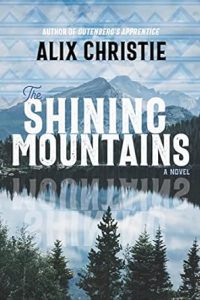Writing Across Worlds
Writing Across Worlds
By Alix Christie
 When I got the call that summer’s day inviting me to visit McDonald Ranch, I whooped at the wheel of my rental car. I was on the Flathead Indian Reservation in northwestern Montana doing preliminary research for a novel about my ancestor’s brother, a Scottish fur trader for the Hudson’s Bay Company, and his mixed-race descendants were welcoming me with open arms. Only a few days later, I was huddled miserably in a nearby motel, paralyzed by anxiety and doubt.
When I got the call that summer’s day inviting me to visit McDonald Ranch, I whooped at the wheel of my rental car. I was on the Flathead Indian Reservation in northwestern Montana doing preliminary research for a novel about my ancestor’s brother, a Scottish fur trader for the Hudson’s Bay Company, and his mixed-race descendants were welcoming me with open arms. Only a few days later, I was huddled miserably in a nearby motel, paralyzed by anxiety and doubt.
“What makes you think you can even begin to imagine a Native woman’s experience?” a white tribal historian had snapped when I outlined my hopes of writing the story of Angus McDonald and his Nez Perce-Mohawk-French wife, Catherine Baptiste.
What, indeed? What gave me, an Anglo Canadian-American, not so much the ‘right’, but the audacity, to try to inhabit a world so distant from my own? The question is more than fair. Every writer of fiction today should be prepared to ask it of themselves. Exactly why and when do we choose to write outside our own experience, reaching across lines of ethnicity, gender, culture? Particularly today, when writers from the dominant culture now understand that those long excluded from our literatures are the rightful tellers of their own stories?
It took four years to research and write “The Shining Mountains,” my historical novel of the McDonalds, a Scots-Native family caught in the crossfire of Manifest Destiny in the American West. It has taken even more years to see it in print. Yet that long gestation has also been a boon. It has helped me, as a white writer descended from Scottish and Norwegian immigrants to Canada, fully understand my decision to step across those boundaries of cultural identity and try to inhabit a Native world.
Writers of historical fiction, by definition, write about periods we haven’t personally experienced. My first novel was about men in medieval Germany. The second is about the inhabitants of the 19th century Rocky Mountain and Pacific Northwest. Inevitably, the past includes people of different cultural backgrounds than the writer’s own. As publishing starts opening up to previously marginalized voices telling their own stories, the question becomes clear: if I am to write their stories, taking up space in the public conversation, I’d better have a very good reason.
The reason was evident, but became clearer over the years I spent visiting on and off the reservation. I too am a McDonald. Angus was my great-great-great grandfather’s younger brother. Thus his hundreds of descendants—members of the Confederated Salish and Kootenai and Nez Perce tribes—are my relatives. I am not Native myself. But I have long known about these Highland ancestors on both sides of the international border, and was deeply intrigued by the lives of Angus and Catherine and their son Duncan.
Tracing their life back to Scotland and down the decades to today has given me a tremendous sense of rootedness. So has the welcome I have received as a distant member of the mixed and marvelous Native American McDonald clan.
This personal reason was swiftly followed by the political. The more I learned about indigenous people and their options when confronted with European fur traders and American colonists, the angrier I was that I was taught none of this in public school in either Kelowna, B.C., or California. Understanding the well-documented history of our countries is essential if we are to move forward.
The McDonalds were directly affected by the so-called “Indian Wars” of the late19th century, especially the Nez Perce war of 1877 which ended in flight north across the border. I hoped that by telling this large story through the lens of one particular family, I might convey some of the human horror of the doctrine of Manifest Destiny.
Yet if I knew dimly why I wanted to tell this story, I didn’t know exactly how. I was emphatically advised by my Native cousins that I should consult respectfully with both tribes, asking for approval and presenting my project for review. The process was long and involved. I was often afraid: of overstepping, of my own ignorance, of betraying implicit bias.
Yet I am grateful today that it took as long as it did. The years allowed relationships to deepen and trust to build. It also gave me time to immerse myself in a vanished multicultural world. I soaked up oral histories, traditional tales, and Catherine’s own words as relayed to her husband. I unearthed genealogical charts and queried relatives in the hopes of reanimating the real woman known in Nez Perce as Tipyelehne Kitalah, the Eagle Rising Up.
The project has been arduous, terrifying and among the most rewarding of my writing life. All along, what has mattered most is sharing this blended family’s extraordinary story of resilience and survival. My late cousin Dr. Joseph McDonald, a tribal and clan elder and the founder of Salish Kootenai College, staunchly supported the project from the start. It meant the world to me that he found the novel “brilliant and invaluable” when I was finally able to put it in his hands last spring.
—
The Shining Mountains
By Alix Christie

The Shining Mountains, Alix Christie
The year is 1838. A young Scotsman forced out of his homeland arrives on the frozen lip of Hudson’s Bay. Angus McDonald is twenty-one, contracted to British masters to trade for fur. But the world he discovers is far beyond even a Highlander’s wildest imaginings: raging rivers, buffalo hunts, and the powerful daughter of an ancient and magnificent people. In Catherine Baptiste, kin to Nez Perce chiefs, Angus recognizes a kindred spirit. The Rocky Mountain West in which they meet will soon be torn apart by competing claims: between British fur traders, American settlers, and the Native peoples who have lived for millennia in the valleys and plateaus of the Shining Mountains’ western slopes.
In this epic family saga, based on the true story of the author’s Scottish forebears, the real history of the American West is revealed in all its terror, beauty and complexity. The Shining Mountains brilliantly limns a world now long forgotten: of blended cultures seeking allies, trading furs for guns and steel, and a way of life in collision with westward colonial expansion.
“Christie’s prose sings with detail, transporting readers back nearly two hundred years to feel the landscape enduring beneath momentous historical change.” Montana, the Magazine of Western History
“A rousing adventure tale steeped in research and oral histories.” Debra Magpie Earling, author of “The Lost Journals of Sacajawea”
“An impressively original, truly epic, and memorable saga” Midwest Book Review
BUY HERE
Alix Christie is an American-Canadian journalist and the author of “Gutenberg’s Apprentice,” (Harper Books, 2014), and “The Shining Mountains”, (University of New Mexico Press, 2023). Her prize-winning stories include “Everychild,” winner of the 2021 Jeffrey E. Smith Editor’s Prize in fiction from The Missouri Review and a Pushcart Prize, and “The Dacha,” a finalist for the Sunday Times (UK) Short Story Award. She earned an MFA in fiction at St Mary’s College of California and is a cultural correspondent for The Economist.
—
https://www.facebook.com/AlixChristieWriter/
@alixechristie (X & Instagram)
Category: On Writing




























